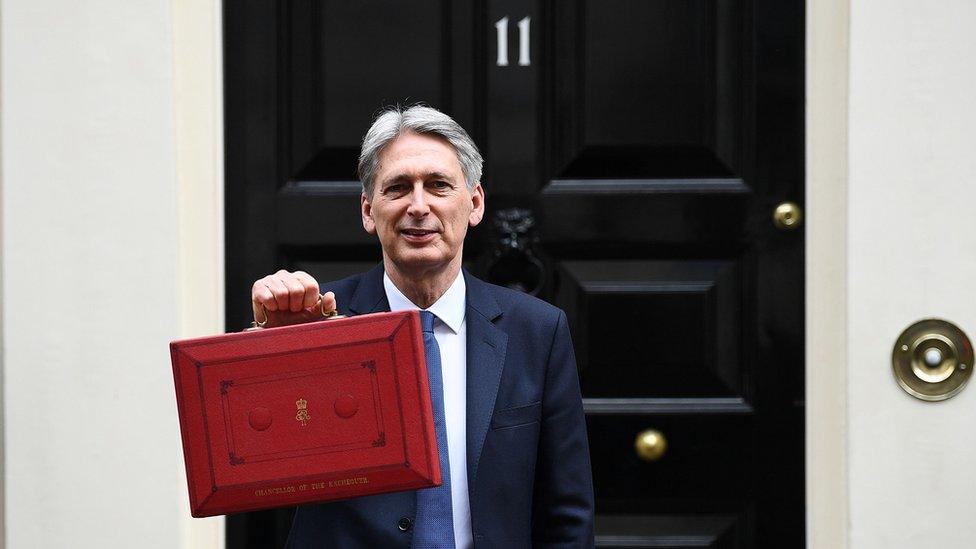So, farewell austerity?
- Published
- comments

Talk of controlling the deficit is now likely to be dialled down
Before the 2010 election, David Cameron and George Osborne believed they would be tested on one issue.
Could they be trusted to get the public finances "back in order".
It was an age-old attack narrative used by the Conservatives over the decades - to great success.
Labour breaks the national bank, eventually, it was claimed.
And the Conservatives are voted in to sweep up the mess.
It was a policy that became known by a single word - austerity.
In the Budget of 2010, Mr Osborne, the Chancellor, announced £81bn of cuts over four years, some of the sharpest reversals in public financing seen for decades.
"It is a hard road, but it leads to a better future," he said.
The argument held, just, in 2015.
Ed Miliband relentlessly attacked the Conservatives on the issue of "cuts".
And was rejected at the ballot box.
Yesterday, a change, and economically as well as politically, a pretty fundamental one.
Yes, Labour didn't win the election.
But Jeremy Corbyn - on a vision of higher spending, higher taxes and higher levels of investment - came closer than almost everyone, apart from maybe Jeremy Corbyn, believed possible.
So close that Theresa May will need the support of the Democratic Unionist Party to maintain her government.
Can cuts continue?
What next for the "sound money" pledge contained in the Conservative manifesto, the idea that cuts would continue for the sake of the health of public finances?
Well, like a number of pledges made by Mrs May, let's say it might well be flexible.
One Tory close to Number 10 told me that the message would need to change or Mrs May would not be able to convince non-Conservative voters to back her.
"It's time for the austerity policies to shift," he said.
Nick Macpherson, the former permanent secretary at the Treasury, tweeted the election result "guarantees a higher deficit".
In short, many economists believe the government will be obliged to borrow more as political uncertainty weighs on growth, leading to less wealth creation and therefore the need for higher borrowing.
Mrs May and her chancellor were already saying before the election - most clearly in private - that the age of constant cuts was harder to sell to the public.
But rather than make an increase in spending the focus of their "offer" to the voter - as Labour tried to do - they allowed the whiff of tax rises to hang over their campaign.
The 'tough' party
The triple tax lock of 2015 (no increases in income tax, national insurance contributions or VAT) was dumped in favour of a single lock on VAT and a vaguer pledge to lower taxes generally.
Mrs May also abandoned the pensions triple lock, which guaranteed a rise in the annual pension of at least 2.5% a year.
And said nothing about curtailing the public sector pay freeze or reversing any of the in-work benefit reductions announced in previous Budgets.
Cuts to public services would continue, Mrs May suggested.
Cuts so deep that the Institute for Fiscal Studies wondered whether they were actually deliverable.
The "tough" party was still on show, and with poll leads storming above 20%, it seemed like a tactic that could work.
But it crumbled in the face of Labour's very different proposition.
Change the record
Mr Corbyn was the change candidate, Mrs May "more of the same".
The classic election split which plays well for the former if people are feeling dissatisfied with where their lives are.
And in an era when real incomes are once again falling, "change" had many attractions.
Now, I expect that the Conservatives will do their best to distance themselves from the nasty party tag.
And, on economic policy at least, the DUP may help.
In their manifesto, the party says that the pensions triple lock should be maintained.
It attacks plans to means test the Winter Fuel Allowance (a Tory pledge) as well as any other "assaults" on benefits, which could of course include the in-work benefits freeze.
If Mrs May wants to push her policies through Parliament she will have to recognise where the DUP is coming from.
Talk of controlling the deficit (the amount the government spends above what it gains in tax revenue) is likely to be dialled down.
The overall debt will be allowed to rise.
Tories I have spoken to say that the Conservatives have to change the record on austerity.
And they are looking to Mrs May to take the lead.
- Published9 June 2017
- Published9 June 2017

- Published9 June 2017